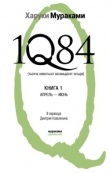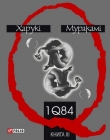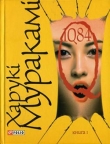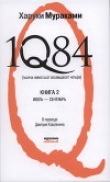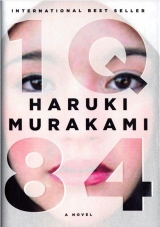
Текст книги "1q84"
Автор книги: Haruki Murakami
Жанр:
Современная проза
сообщить о нарушении
Текущая страница: 69 (всего у книги 81 страниц)
“I think so.”
“Air Chrysalis contains information of critical importance to them. When it was published and became widely read, the voice went silent. But what critical information could the book be pointing toward?”
“During those last four days of my confinement I thought a lot about that,” Komatsu said. “Air Chrysalis is a pretty short novel. In the story the world is filled with Little People. The ten-year-old girl who is the protagonist lives in an isolated community. The Little People secretly come out at night and create an air chrysalis. The girl’s alter ego is inside the chrysalis and a mother-daughter relationship is formed—the maza and the dohta. There are two moons in that world, a large one and a small one, probably symbolizing the maza and the dohta. In the novel the protagonist—based on Fuka-Eri herself, I think—rejects being a maza and runs away from the community. The dohta is left behind. The novel doesn’t tell us what happened to the dohta after that.”
Tengo stared for a time at the ice melting in his glass.
“I wonder if the one who hears the voice needs the dohta as an intermediary,” Tengo said. “It’s through her that he can hear the voice for the first time, or perhaps through her that the voice is translated into comprehensible language. Both of them have to be there for the message of the voice to take its proper form. To borrow Fuka-Eri’s terms, there’s a Receiver and a Perceiver. But first of all the air chrysalis has to be created, because the dohta can only be born through it. And to create a dohta, the proper maza must be there.”
“That’s your opinion, Tengo.”
Tengo shook his head. “I wouldn’t call it an opinion. As I listened to you summarize the plot, I just thought that must be the way it is.”
As he rewrote the novel, and afterward, Tengo had pondered the meaning of the maza and the dohta, but he was never quite able to grasp the overall picture. But now, as he talked with Komatsu, the pieces gradually fell into place. Though he still had questions: Why did an air chrysalis materialize above his father’s bed in the hospital? And why was Aomame, as a young girl, inside?
“It’s a fascinating system,” Komatsu said. “But isn’t it a problem for the maza to be separated from the dohta?”
“Without the dohta, it’s hard to see the maza as a complete entity. As we saw with Fuka-Eri, it’s difficult to pinpoint exactly what that means, but there is something missing—like a person who has lost his shadow. What the dohta is like without the maza, I have no idea. Probably they’re both incomplete, because, ultimately, the dohta is nothing more than an alter ego. But in Fuka-Eri’s case, even without the maza by her side, the dohta may have been able to fulfill her role as a kind of medium.”
Komatsu’s lips were stretched in a tight line for a while, then turned up slightly. “Are you thinking that everything in Air Chrysalis really took place?”
“I’m not saying that. I’m just making an assumption—hypothesizing that it’s all real, and going from there.”
“All right,” Komatsu said. “So even if Fuka-Eri’s alter ego goes far away from her body, she can still function as a medium.”
“Which explains why Sakigake isn’t forcing her to return, even if they know her whereabouts. Because in her case, even if the maza isn’t nearby, the dohta can still fulfill her duties. Maybe their connection is that strong, even if they’re far apart.”
“Okay …”
Tengo continued, “I imagine that they have multiple dohtas. The Little People must use the chance to create many air chrysalises. They would be anxious if all they had was one Perceiver. Or the number of dohtas who can function correctly might be limited. Maybe there is one powerful, main dohta, and several weaker auxiliary dohtas, and they function collectively.”
“So the dohta that Fuka-Eri left behind was the main dohta, the one who functions properly?”
“That seems possible. Throughout everything that has happened, Fuka-Eri has always been at the center, like the eye of a hurricane.”
Komatsu narrowed his eyes and folded his hands together on the table. When he wanted to, he could really focus on an issue.
“You know, Tengo, I was thinking about this. Couldn’t you hypothesize that the Fuka-Eri we met is actually the dohta and what was left behind at Sakigake was the maza?”
This came as a bit of a shock. The idea had never occurred to Tengo. For him, Fuka-Eri was an actual person. But put it that way, and it started to sound possible. I have no periods. So there’s no chance I’ll get pregnant. Fuka-Eri had announced this, after they had had intercourse that night. If she was nothing more than an alter ego, her inability to get pregnant would make sense. An alter ego can’t reproduce itself—only the maza can do it. Still, Tengo couldn’t accept that hypothesis—that it was possible he had had intercourse with her alter ego, not the real Fuka-Eri.
“Fuka-Eri has a distinct personality. And her own code of conduct. I sort of doubt an alter ego could have those.”
“Exactly,” Komatsu agreed. “If she has nothing else, Fuka-Eri does have her own distinct personality and code of conduct. I would have to agree with you on that one.”
Still, Fuka-Eri was hiding a secret, a critical code hidden away inside this lovely girl, a code he had to crack. Tengo sensed this. Which one was the real person and which one the alter ego? Or was the whole notion of classifying into “real” and “alter ego” a mistake? Maybe Fuka-Eri was able, depending on the situation, to manipulate both her real self and her alter ego?
“There are several things I still don’t understand,” Komatsu said, resting his hands on the table and staring at them. For a middle-aged man, his fingers were long and slender.
“The voice has stopped speaking, the water in the well has dried up, the prophet has died. What will happen to the dohta after that? She won’t follow him in death like widows do in India.”
“When there’s no more Receiver, there’s no need for a Perceiver.”
“If we take your hypothesis a step further, that is,” Komatsu said. “Did Fuka-Eri know that would be the result when she wrote Air Chrysalis? That Sakigake man told me it wasn’t intentional. At least it wasn’t her intention. But how could he know this?”
“I don’t know,” Tengo said. “But I just can’t see Fuka-Eri intentionally driving her father to his death. I think her father was facing death for some other reason. Maybe that’s why she left in the first place. Or maybe she was hoping that her father would be freed from the voice. I’m just speculating, though, and I have nothing to back it up.”
Komatsu considered this for a long time, wrinkles forming on either side of his nose. Finally he sighed and glanced around. “What a strange world. With each passing day, it’s getting harder to know how much is just hypothetical and how much is real. Tell me, Tengo, as a novelist, what is your definition of reality?”
“When you prick a person with a needle, red blood comes out—that’s the real world,” Tengo replied.
“Then this is most definitely the real world,” Komatsu said, and he rubbed his inner forearm. Pale veins rose to the surface. They were not very healthy-looking blood vessels—blood vessels damaged by years of drinking, smoking, an unhealthy lifestyle, and various literary intrigues. Komatsu drained the last of his highball and clinked the ice around in the empty glass.
“Could you go on with your hypothesis? It’s getting more interesting.”
“They are looking for a successor to the one who hears the voice,” Tengo said. “But they also have to find a new, properly functional dohta. A new Receiver will need a new Perceiver.”
“In other words, they need to find a new maza as well. And in order to do so, they have to make a new air chrysalis. That sounds like a pretty large-scale operation.”
“Which is why they’re so deadly serious.”
“Exactly.”
“But they can’t be going about this blind,” Tengo said. “They’ve got to have somebody in mind.”
Komatsu nodded. “I got that impression, too. That’s why they wanted to get rid of us as fast as they could—so we don’t bother them anymore. I think we were quite a blot on their personal landscape.”
“How so?”
Komatsu shook his head. He didn’t know either.
“I wonder what message the voice told them until now. And what connection there is between the voice and the Little People.”
Komatsu shook his head listlessly again. This, too, went beyond anything the two of them could imagine.
“Did you see the movie 2001: A Space Odyssey?”
“I did,” Tengo said.
“We’re like the apes in the movie,” Komatsu said. “The ones with shaggy black fur, screeching out some nonsense as they dance around the monolith.”
A new pair of customers came into the bar, sat down at the counter like they were regulars, and ordered cocktails.
“There’s one thing we can say for sure,” Komatsu said, sounding like he wanted to wind things down. “Your hypothesis is convincing. It makes sense. I always really enjoy having these talks with you. But we’re going to back out of this scary minefield, and probably never see Fuka-Eri or Professor Ebisuno again. Air Chrysalis is nothing more than a harmless fantasy novel, with not a single piece of concrete information in it. And what that voice is, and what message it’s transmitting, have nothing to do with us. We need to leave it that way.”
“Get off the boat and get back to life onshore.”
Komatsu nodded. “You got it. I’ll go to work every day, gathering manuscripts that don’t make a difference one way or another in order to publish them in a literary journal. You will go to cram school and teach math to promising young people, and in between teaching, you’ll write novels. We’ll each go back to our own peaceful, mundane lives. No rapids, no waterfalls. We’ll quietly grow old. Any objection?”
“We don’t have any other choice, do we?”
Komatsu stretched out the wrinkles next to his nose with his finger. “That’s right. We have no other choice. I can tell you this—I don’t want to ever be kidnapped again. Being locked up in that room once is more than enough. If there were a next time, I might not see the light of day. Just the thought of meeting that duo again makes my heart quake. They only need to glare at you and you would keel over.”
Komatsu turned to face the bar and signaled with his glass for a third highball. He stuck a fresh cigarette in his mouth.
“But why haven’t you told me this until now? It has been quite some time since the kidnapping, over two months. You should have told me earlier.”
“I don’t know,” Komatsu said, slightly inclining his head. “You’re right. I was thinking I should tell you, but I kept putting it off. I’m not sure why. Maybe I had a guilty conscience.”
“Guilty conscience?” Tengo said, surprised. He had never expected to hear Komatsu say that.
“Even I can have a guilty conscience,” Komatsu said.
“About what?”
Komatsu didn’t reply. He narrowed his eyes and rolled the unlit cigarette around between his lips.
“Does Fuka-Eri know her parents have died?” Tengo asked.
“I think she probably does. I imagine at some point Professor Ebisuno told her about it.”
Tengo nodded. Fuka-Eri must have known about it a long time ago. He had a distinct feeling she did. He was the only one who hadn’t been told.
“So we get out of the boat and return to our lives onshore,” Tengo repeated.
“That’s right. We edge away from the minefield.”
“But even if we want to do that, do you think we can go back to our old lives that easily?”
“All we can do is try,” Komatsu said. He struck a match and lit the cigarette. “What specifically bothers you?”
“Lots of things around us are already starting to fall into strange patterns. Some things have already been transformed, and it may not be easy for them to go back the way they were.”
“Even if our lives are on the line?”
Tengo gave an ambiguous shake of his head. He had been feeling for some time that he was caught up in a strong current, one that never wavered. And that current was dragging him off to some unknown place. But he couldn’t really explain it to Komatsu.
Tengo didn’t reveal to Komatsu that the novel he was writing now carried on the world in Air Chrysalis. Komatsu probably wouldn’t welcome the news. And Sakigake would certainly be less than pleased. If he wasn’t careful, he might step into a different minefield, or get the people around him mixed up in it. But a narrative takes its own direction, and continues on, almost automatically. And whether he liked it or not, Tengo was a part of that world. To him, this was no longer a fictional world. This was the real world, where red blood spurts out when you slice open your skin with a knife. And in the sky in this world, there were two moons, side by side.
CHAPTER 19
Ushikawa
WHAT HE CAN DO
THAT MOST PEOPLE CAN’T
It was a quiet, windless Thursday morning. Ushikawa woke as usual before six and washed his face with cold water. He brushed his teeth as he listened to the NHK news on the radio, and he shaved with the electric razor. He boiled water in a pot, made instant ramen, and, after he finished eating, drank a cup of instant coffee. He rolled up his sleeping bag, stowed it in the closet, and sat down at the window in front of his camera. The eastern sky was beginning to grow light. It looked like it was going to be a warm day.
The faces of all the people who left for work in the morning were etched in his mind. There was no need to take any more photos. From seven to eight thirty they hurried out of the apartment building to the station—the usual suspects. Ushikawa heard the lively voices of a group of elementary school pupils heading off for school. The children’s voices reminded him of when his daughters were little. His daughters had thoroughly enjoyed elementary school. They took piano and ballet lessons, and had lots of friends. To the very end, Ushikawa had found it hard to accept that he had these ordinary, happy kids. How could someone like him possibly be the father of children like these?
After the morning rush, almost no one came in or out of the building. The children’s lively voices had disappeared. Ushikawa laid aside the remote control for the shutter, leaned against the wall, smoked a cigarette, and kept an eye on the entrance through a gap in the curtain. As always, just after ten a.m., the mailman came on his small red motorcycle and adeptly sorted the mail into all the boxes. From what Ushikawa could make out, half of it was junk mail, stuff that would be tossed away, unopened. As the sun rose higher, the temperature went up, and most of the people along the street took off their coats.
It was after eleven when Fuka-Eri appeared at the entrance to the building. She wore the same black turtleneck as before, a gray short coat, jeans, sneakers, and dark sunglasses. And an oversized green shoulder bag slung diagonally across her shoulder. The bag was bulging with, no doubt, all sorts of things. Ushikawa left the wall he was leaning against, went over to the camera on the tripod, and squinted through the viewfinder.
The girl was leaving there, that much he understood. She had stuffed all her belongings in that bag and was setting off for somewhere else. She would never be back there again. He could sense it. Maybe she decided to leave here, he thought, because she noticed I was staking out the place. The thought made his heart race.
As she stepped out of the entrance, she came to a halt and stared up at the sky like she had done before, searching for something among the tangle of electric lines and the transformers. Her sunglasses caught the light and glittered. Had she found what she was looking for? Or maybe not? He couldn’t read her expression through the sunglasses. She must have stood there, frozen, for a good thirty seconds, gazing up at the sky. Then, almost as an afterthought, she turned her head and looked straight at the window behind which Ushikawa was hiding. She took off her sunglasses and stuck them in a coat pocket. She frowned and focused her gaze right on the camouflaged telephoto lens. She knows, Ushikawa thought once again. The girl knows I’m hiding in here, that she’s being secretly watched. And she was looking at him in the opposite direction, watching Ushikawa through the lens and back through the viewfinder. Like water flowing backward though a curved pipe. Ushikawa felt the flesh crawl on both his arms.
Fuka-Eri blinked every few moments. Like independent, silent living creatures, her eyelids slowly went up and down in a studied way. Nothing else moved. She stood there like some lofty bird with neck twisted, staring straight at Ushikawa. He couldn’t pull his eyes away from her. It felt as if the entire world had come to a momentary halt. There was no wind, and sounds no longer made the air vibrate.
Finally Fuka-Eri stopped looking at him. She raised her head again and gazed up at the sky, as she had done a moment before. This time, though, she stopped after a couple of seconds. Her expression was unchanged. She took the dark sunglasses out of her pocket, put them on again, and headed toward the street. She walked with a smooth, unhesitant stride.
I should go out and follow her. Tengo isn’t back yet, and I have the time to find out where she’s going. It couldn’t hurt to find out where she’s moving to. But somehow Ushikawa couldn’t stand up from the floor. His body was numb. That sharp gaze she had sent through the viewfinder had robbed him of the strength he needed to take action.
It’s okay, Ushikawa told himself as he sat there on the floor. Aomame is the one I have to locate. Eriko Fukada is a fascinating girl, but she’s not my main priority here. She’s just a supporting actress. If she’s leaving, why not just let her go?
Once on the main street, Fuka-Eri hurried off toward the station. She didn’t look back. Through the gap in the sun-bleached curtains, Ushikawa watched as she went. Once the green shoulder bag, swinging back and forth, disappeared from view, he practically crawled away from the camera and leaned against the wall again, waiting for his strength to return. He took out a Seven Stars, lit it, and inhaled the smoke deeply. But the cigarette was tasteless.
His strength didn’t return. His arms and legs still felt numb. He suddenly realized a strange space had formed inside him, a kind of pure hollow. This space signified a simple lack, a nothingness. Ushikawa sat there in the midst of this unknown void, unable to rise. He felt a dull pain in his chest—not exactly pain, but more like the difference in air pressure at the point where the material and the immaterial meet.
He sat for a long time at the bottom of that void, leaning against the wall, smoking tasteless cigarettes. When that girl left, she left behind this void. No, maybe not. Maybe she just showed me something that was already there, inside me.
Ushikawa knew that Eriko Fukada had literally shaken him to his core. Her unwavering, pointed gaze shook him not only physically, but to the center of his being, like someone who had fallen passionately in love. He had never felt this way before in his life.
No, that can’t be right, he thought. Why should I be in love with that girl? We have to be the most ill-matched pair one could possibly imagine. He didn’t need to check himself out in the mirror to confirm this. But it wasn’t just about looks. In every possible aspect, he decided, no one is further removed from her than me. Sexually, he wasn’t attracted to her. As far as sexual desire was concerned, a couple of times a month Ushikawa called a prostitute he knew, and that was enough. Call her up, have her over to a hotel room, and have sex—like going to the barber.
It had to be something on a more spiritual level, Ushikawa concluded. It was hard to accept, but Ushikawa and that lovely girl had—while staring at each other through opposite ends of the camouflaged telephoto lens—reached a kind of understanding that emanated from the deepest, darkest recesses of their beings. It had happened in an instant, yet they had laid bare their very souls. And then she had gone off, leaving Ushikawa behind, alone in this void.
The girl knew I was secretly observing her through this telephoto lens, and she must have known, too, that I followed her to the supermarket near the station. She never looked back even once then, but she definitely knew I was there. But he hadn’t seen any criticism in her eyes. Ushikawa felt that somehow, in some far-off, deep place, she had understood him.
The girl had shown up, then left. We came from different directions, our paths happened to cross, our eyes met for an instant, then we moved off in different directions once more. I probably won’t ever run across Eriko Fukada again.
Leaning against the wall, Ushikawa looked through the gap in the curtain and watched people coming and going. Maybe Fuka-Eri would come back. Maybe she would remember something important she had left back in the apartment. But she didn’t. She had made up her mind to move on to somewhere else, and she would never return.
Ushikawa spent the afternoon feeling deeply powerless. This sense of impotence was formless, weightless. His blood moved slowly, sluggishly, through his veins. It was as if his vision were covered by a fine mist, while the joints in his arms and legs felt creaky and dull. When he shut his eyes, the ache of her gaze stabbed at his ribs, the ache rolling in and out like gentle waves at the shore, rolling in again, then receding. Sometimes the pain was so great it made him wince. At the same time, though, Ushikawa realized it gave him a warm feeling, like nothing he had ever experienced.
His wife and two daughters, his snug little house with a lawn in Chuorinkan—they had never made him feel this warm. He had always had something like a clod of frozen dirt stuck in his heart—a hard, cold core he had always lived with. He had never even felt it as cold. For him this was the normal temperature. Even so, Fuka-Eri’s gaze had, if even for a moment, melted that icy core. And it brought on the dull ache. The warmth and the pain came as a pair, and unless he accepted the pain, he wouldn’t feel the warmth. It was a kind of trade-off.
In a little sunny spot, Ushikawa experienced the pain and the warmth simultaneously. Quietly, without moving a muscle. It was a calm, peaceful winter’s day. People on the street passed through the delicate sunshine as they strolled by, but the sun was steadily moving west, hidden in the shadow of the building, and the little pool of sunlight he was in soon disappeared. The warmth of the afternoon was gone, and the cold of the night was gathering around him.
Ushikawa sighed deeply and reluctantly peeled himself away from the wall. His body still had a lingering numbness, but not enough to stop him from moving about the room. He finally rose to his feet, stretched his limbs, and moved his short, thick neck around to work out the kinks. He balled his fists, then stretched out his fingers, again and again. Then he got down on the tatami and did his usual stretching exercises. All his joints crackled dully, and his muscles slowly regained their normal suppleness.
It was now the time of day when people came back from work and school. I need to continue to keep a watch over them, he told himself. This isn’t a question of whether I want to or not, or whether it’s the right thing to do. Once I start something, I have to see it through.
Ushikawa sat down again behind the camera. It was completely dark outside now, and the light at the entrance had come on. It must be on a timer, he thought. Like nameless birds returning to their shabby nests, people stepped into the entrance. Tengo Kawana wasn’t among them, but Ushikawa figured he would be back before long. He couldn’t take care of his sick father forever. Most likely he would be back in Tokyo before the new week started, so he could return to work. Within a few days—or maybe even today or tomorrow.
I may well be just a cheerless, grubby little creature, a bug on the damp underside of a rock. So be it—I’ll be the first to admit it. But I’m a relentlessly capable, patient, tenacious bug. I don’t give up easily. Once I get ahold of a clue, I pursue it to the bitter end. I’ll climb up the highest wall you’ve got. I have to get back that cold core inside me. Right now, that’s exactly what I need.
Ushikawa rubbed his hands together in front of the camera, and checked to make sure all ten fingers were working properly.
There are lots of things ordinary people can do that I can’t. That’s for sure. Playing tennis, skiing, for instance. Working in a company, having a happy family. On the other hand, there are a few things I can do that most other people can’t. And I do these few things very, very well. I’m not expecting applause or for people to shower me with coins. But I do need to show the world what I’m capable of.
At nine thirty Ushikawa ended his surveillance for the day. He heated a can of chicken soup over the portable stove and carefully sipped it with a spoon. He ate two cold rolls, then polished off an apple, peel and all. He peed, brushed his teeth, spread out his sleeping bag, stripped down to his underwear, and snuggled inside. He zipped the bag up to his neck and curled up like a bug.
And thus Ushikawa’s day was over. It hadn’t been a very productive day. All he had been able to do was watch Fuka-Eri exit the building with all her belongings. He didn’t know where she had gone. Somewhere, but where? Inside the sleeping bag he shook his head. Wherever she went, it didn’t concern him. After a time his frozen body warmed up, his mind faded, and he fell into a deep sleep. Once more, the tiny frozen core occupied a solid place in his soul.
Nothing much happened the next day. Two days later was Saturday, another warm, peaceful day. Most people slept in during the morning. Ushikawa, though, sat by the window, listening to a tiny radio—the news, traffic updates, the weather report.
Just before ten a large crow flew up and stood at the empty front steps of the building. The crow looked around meticulously, moving its head a few times like it was nodding. It bobbed its thick large beak up and down, its brilliant black feathers glistening in the sunlight. The mailman pulled up on his small red motorcycle and the crow reluctantly spread its wings wide and flew off. As it flew away it squawked once. After the mailman had sorted all the mail into the mailboxes and left, a flock of sparrows twittered over. They bustled around the entrance but found nothing worthwhile and flew away. Next it was a striped cat’s turn. He had on a flea collar and probably belonged to a neighbor. Ushikawa had never seen the cat before. The cat peed in the dried-up flower bed, sniffed the result, and—apparently displeased with what it found—twitched its whiskers, as if it were bored. Tail up, it disappeared behind the building.
In the morning several residents exited the building. From the way they were dressed, it looked like they were going out for a relaxed day, or going shopping in the neighborhood—one or the other. Ushikawa knew almost all their faces by now, but he had not a speck of interest in their personalities or private lives. He never even tried to imagine them.
Your own lives are surely very important to each one of you. Very precious to you. I get it. But to me they don’t matter one way or the other. To me, you’re just flimsy paper dolls walking across a stage. There’s only one thing I’m asking of all of you—remain paper dolls and don’t interfere with my job here.
“Isn’t that right, Mrs. Pear?” He had given the woman currently passing this nickname, because she was pear shaped with a huge rear end. “You’re just a cutout paper doll. You’re not real. Do you realize that? Though you are a bit on the chunky side for a paper doll.”
As he thought this, though, everything in the scene before him began to seem meaningless, to not matter one way or the other. Maybe the scene in front of him didn’t exist in the first place. Maybe he was the one being deceived, by cutout people who didn’t really exist. Ushikawa grew uneasy. Being locked up in this empty apartment, day after day, spying on people, must be getting to him—something that would definitely get on a person’s nerves. He decided to verbalize his thoughts, to pull himself out of this funk.
“G’morning, there, Long Ears,” he said, looking through the viewfinder and addressing a tall, thin old man. The tips of the old man’s ears stuck out like horns from beneath his white hair. “Out for a walk? Walking’s good for you. It’s nice out today, so have a good time. I would love to take a walk and stretch my limbs a bit, but I’m stuck here keeping watch over this crummy entrance day after day.”
The old man had on a cardigan and wool trousers, and had excellent posture. He would look perfect taking a faithful white dog out for a walk, but pets weren’t allowed in the building. Once the old man was gone, Ushikawa was suddenly struck by a sense of impotence. This surveillance is going to end up being a waste of time, he decided. My intuition is worthless, and all the hours I’ve spent in this vacant room are leading me exactly nowhere. All I have to show for it is a set of frayed nerves, worn away like the bald head of a Jizo statue that passing children rub for good luck.
After twelve Ushikawa ate an apple and some cheese and crackers, and a rice ball with pickled plum inside. He then leaned back against the wall and fell asleep. It was a short, dreamless sleep, yet when he awoke he couldn’t remember where he was. His memory was a perfectly square, perfectly empty box. The only thing in the box was empty space. Ushikawa gazed around the space. He found it wasn’t just a void, but a dim room—empty, cold, without a stick of furniture. He didn’t recognize the place. There was an apple core on an unfolded newspaper next to him. Ushikawa felt confused. Why am I in such a weird place?
Finally it came to him, and he remembered what he had been doing: staking out the entrance to Tengo’s apartment. That’s right. That’s why I have this single-lens reflex Minolta with a telephoto lens. He remembered the old man with white hair and long ears out for a walk alone. Like birds flying home to their nests at twilight, memories gradually returned to the empty box. And two solid facts emerged:


